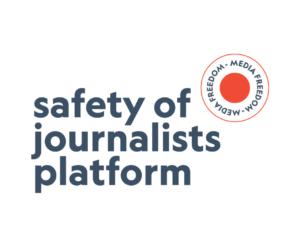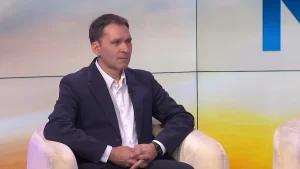The season of “coup attempts” and “chaos incitement” is once again in full swing on the influential Serbian pro-government Informer TV, whose owner, Dragan J. Vučićević, has recently been “exposing” alleged conspiracies against Serbia supposedly being planned by the protesting students and civil society. Although some of Vučićević’s claims have already been proven false, ominous warnings and the targeting of individuals by this television station continue. In addition to the lack of a functional Regulatory Authority for Electronic Media (REM), representatives of journalistic associations point out that such content is also enabled by the willingness of state officials to deem it acceptable.
The bulk of the claims that have already been refuted were made by Vučićević in a broadcast on TV Informer on 23 May, when, citing anonymous sources, he announced that demonstrators would block all public transport depots in Belgrade during the night of 26 May in order to create “chaos in the streets” and a “collapse” in the capital.
Then, according to Vučićević, the plan was for a “complete blockade of Belgrade” to take place on May 29, specifically key intersections, in what he called the “Black Box” operation.
“They call it ‘the total blockade,’ that’s their goal, to bring everything to a halt, and that’s their ‘Black Box’—to put Serbia in a black box, to blacken Serbia,” said Dragan J. Vučićević, while drawing a schematic representation of the alleged conspiracy against Serbia on a whiteboard.
Both 26 May and 29 May have since come and gone, and none of the announced events materialised.
Additionally, in the same broadcast, Vučićević publicly named several participants of the “POINT” conference held in Sarajevo from May 28 to 31, including Nikola Burazer, executive editor of the European Western Balkans portal, claiming that the purpose of the conference was “to overthrow the government in Serbia.”
“Some extremists and foreign agencies in Sarajevo are training them… on how to radicalize the situation in Serbia,” said Vučićević, while one of the show participant Tomislav Lovreković suggested that the Serbian intelligence agency (BIA) should “meet them at the border” and take them to facilities with basements where they “could fall down some dark stairs.”
POINT (Political Accountability and New Technologies) is the name of a conference organised by the citizens’ association “Zašto ne” (“Why Not”) in Sarajevo. The first edition of the conference was held in 2012, and this year marks its thirteenth iteration.
“It is not true that this is some kind of ‘extremist training’ in Sarajevo or that the conference is entirely dedicated to the protests in Serbia,” reported the portal Raskrinkavanje.ba.
In a previous broadcast on Informer TV, dated 21 May, lawyer Zdenko Tomanović was labelled as the organiser of the blockades and a “coup attempt.” Tomanović’s law office issued a statement describing the claims as propaganda terror and announced that they would file criminal complaints and lawsuits for damages.
Speaking on N1 television, Tomanović stated that the allegations made about him by Informer were picked up by other “regime propaganda outlets,” and that their goal was “to intimidate citizens, disturb the public, and incite panic.”
However, denials and the failure of predictions to come true have not deterred Informer, which, on 29 May —the day the alleged blockade of Belgrade was supposed to happen according to the May 23 broadcast—published a new claim about an ongoing operation named “Atlas,” under the headline: “Blockaders formed paramilitary units, goal – bloodshed at universities.”
“According to Informer’s reliable sources, extreme blockaders are preparing a militant action called ‘Operation Atlas’ with the explicit goal of physically confronting any student or professor who tries to return to regular classes!” the article states, while in the broadcast, with the familiar backdrop of a whiteboard diagram of the alleged conspiracy, Dragan J. Vučićević once again presented details about “new threats to the state.”
Established practices
Accusations that civil society organisations, activists, and demonstrators are part of a conspiracy aimed at “overthrowing the state” have been coming for years from government officials and media close to them, and intensified over the past year, during several waves of mass protests. Among other things, the Centre for Contemporary Politics was falsely accused last year of organising a meeting on the “extra-institutional takeover of power.”
Both the President of the Republic, Aleksandar Vučić, and Dragan J. Vučićević spent last year drawing schematic representations of conspiracies against Serbia and the funding of civil society, and the Informer editor is continuing this “tradition” into 2025.
In addition, in recent weeks, documentaries produced by the pro-government NGO Center for Social Stability have become prominent. These films link critical media outlets and non-governmental organizations to foreign intelligence services and alleged threats to Serbia’s sovereignty—without presenting any concrete evidence.
Despite this avalanche of accusations, not a single individual from civil society has ever been officially charged by the judicial authorities for the alleged offences. Since 2023, there have been frequent arrests of activists and demonstrators on charges of “violent overthrow of the constitutional order,” the most notable case being six activists from the Free Citizens Movement and the STAV group from Novi Sad, who were placed under house arrest—yet no convictions have been made against them or others.
Filipović: REM is primarily responsible for this kind of content; the problem is also the government’s failure to distance itself
Tamara Filipović, Secretary General of the Independent Journalists’ Association of Serbia (NUNS), told our portal that the Regulatory Authority for Electronic Media (REM) is “the primary and responsible body that should react to this type of propagandistic and potentially harmful content.”
Since November, REM has had no active Council, as the previous one’s mandate expired under the new Law on Electronic Media. The ruling majority, which was supposed to launch a competition for new members last summer, only did so at the end of the year, and the competition was later annulled following student protests and opposition criticism. A new competition to appoint the REM Council is currently underway.
Tamara Filipović emphasises that REM has a legally defined role in overseeing electronic media, and that this role remains valid even in the absence of a formally constituted Council.
“The professional services within REM are obligated to continuously monitor programming, document irregularities, and prepare cases for decision-making as soon as the Council is formed. Even in its current state, REM is required to receive complaints from citizens and organizations and to process them in accordance with procedures,” Filipović said.
She adds that citizens and journalists have the legal right to publish corrections or rebuttals, although, as she notes, “it is clear that in an environment of systemic discreditation, this is often not an effective mechanism, as it requires constant responses to a series of attacks.”
In cases where content may pose a threat to the safety of individuals, including journalists, the public prosecutor’s office also has jurisdiction and can act ex officio, says Tamara Filipović.
However, she adds that beyond institutional mechanisms, which function retroactively, what is also necessary is a clear commitment from the state, especially from top public officials, that this kind of pseudo-journalism must not be supported even rhetorically, let alone funded with public money.
“Such a shift could make a real difference in the media landscape, which today is overwhelmed with disinformation and content aimed at targeting individuals rather than informing the public,” Filipović concludes.
Source: European Western Balkans




